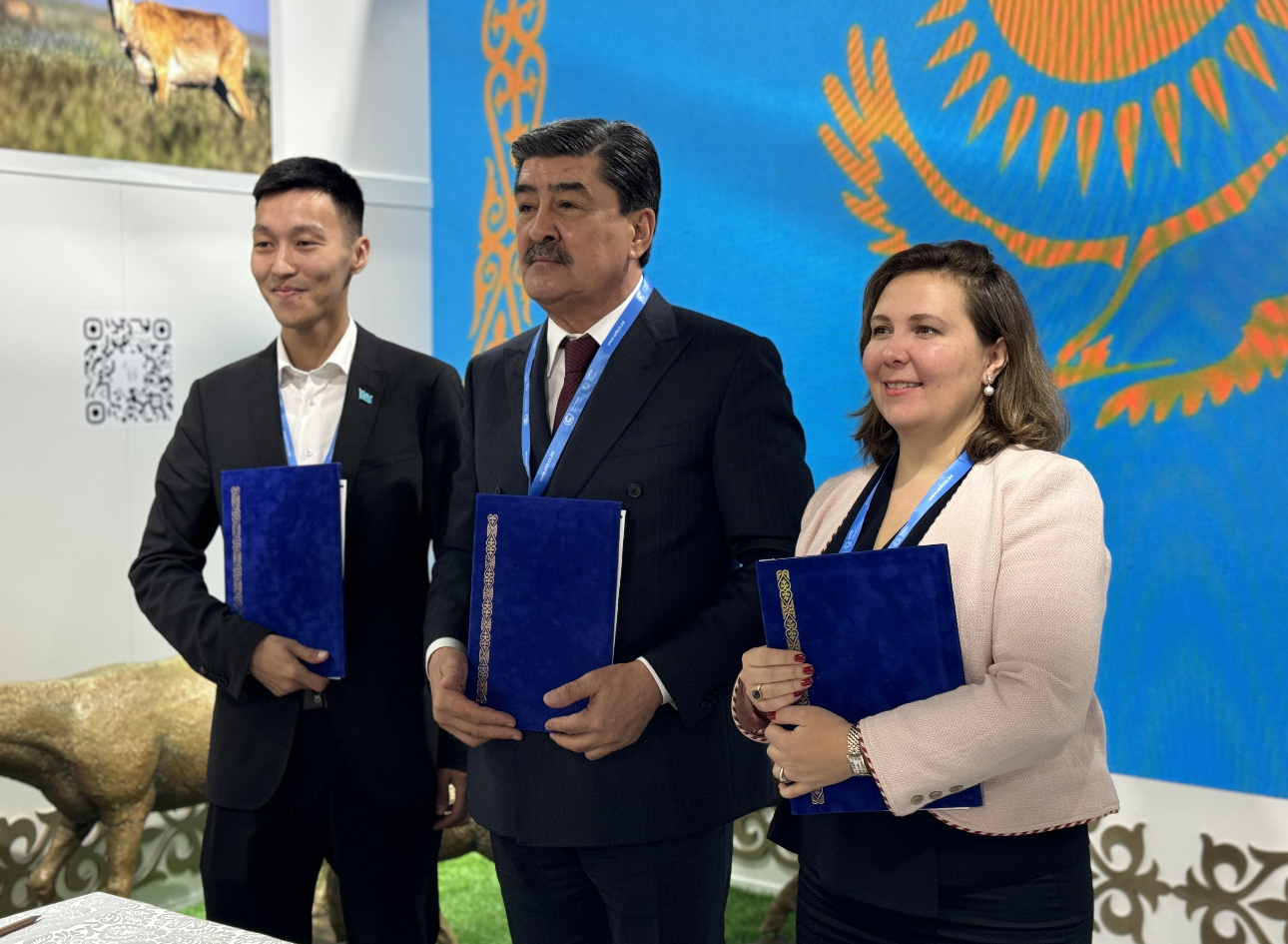Kazakh Ministry Signs Strategic Agreement on Regenerative Agriculture at COP29

BAKU – As the 29th United Nations Climate Change Conference continues on its fourth day in Baku, Azerbaijan, the Kazakh Ministry of Ecology and Natural Resources signed a memorandum with Ormex, a Paris-based company specializing in regenerative agriculture practices, and Chapter Zero Kazakhstan.

Chapter Zero Kazakhstan CEO Sabit Mukhanov, Minister Yerlan Nyssanbayev, and Ormex CEO Goulnara Aguiar. Photo credit: Assel Satubaldina/ The Astana Times
This agreement will support the development of sustainable agricultural practices that reduce carbon emissions, improve soil health, enhance water retention, and preserve biodiversity across the country.
Regenerative agriculture is a transformative approach aimed at restoring ecosystems, empowering rural communities, and building climate resilience from the ground up. In other words, it is about doing agriculture and farming in harmony with nature.
Minister of Ecology and Natural Resources Yerlan Nyssanbayev said climate change demands new approaches to measuring and reducing emissions. The new partnership is just about that.

The participants of the session on innovative carbon measurement. Photo credit: Assel Satubaldina/ The Astana Times
“Resilient agriculture and restoring soil health are not only a way to reduce carbon footprint, but also improve food security and well-being of our citizens,” said Nyssanbayev.
“We see great potential for converging approaches and establishing reliable channels for data exchange. These steps will, in my view, not only increase transparency and accountability but also increase access to climate finance needed to further develop our low carbon field,” he said.
A key element of the partnership will be a project to establish eco-climate stations in Kazakhstan.
“These stations will use innovative technologies, remote sensing and remote monitoring to measure the carbon balance and to obtain the gases. Such stations will be an integral part of our climate change adaptation strategy, providing accurate and timely data to assess the effectiveness of measures to reduce emissions and improve environmental sustainability,” he added.
In his remarks, Сhapter Zero Kazakhstan CEO Sabit Mukhanov said the memorandum represents a shared commitment to “rejuvenating natural resources, empowering farmers and fostering an agricultural system that aligns with the principles of sustainability and resilience.”
He emphasized that agriculture can be a “powerful ally” in combating climate change.
“At Chapter Zero Kazakhstan, we strive to mobilize corporate leaders, policymakers, and stakeholders to embrace the principles of effective climate governance. As part of the Global Climate Governance Initiatives supported by the World Economic Forum, our mission is to integrate sustainability into every aspect of corporate strategy and national development,” he said.
He said in this partnership that Ormex’s expertise in regenerative agriculture and carbon credit certification will provide Kazakhstan with the tools to transition its agricultural sector to a more sustainable model.
“With their advanced methodologies for soil restoration and monitoring ecosystem, Ormix ensures that every initiative is measurable, transparent, and impactful. Their use of blockchain technology for carbon credit registration further guarantees accountability, positioning Kazakhstan as a leader in leveraging innovative solutions for climate action,” said Mukhanov.
“Farmers will benefit from training programs and access to cutting-edge regenerative techniques tailored to research that considers Kazakhstan’s diverse landscapes and ecological requirements,” he added.
Speaking to The Astana Times, Goulnara Aguiar, CEO and co-founder of Ormex, called this agreement historic.
“This is a historic agreement to start introducing carbon removal projects in national determined contribution [NDC] and have it as a solution to offset emissions of different private sectors and corporates in Kazakhstan,” said Aguiar.
“How do we regenerate agriculture? By recreating the biomass and by nourishing the soils. You know, soils are alive. It is like a person. If you do not feed the person, don’t nourish the person, or give him enough water, this person will die, right? The same happens with soils. Without providing enough biomass and only taking from the soils, they decrease and become degraded. They can die and become sand,” she explained.
She highlighted several aspects of regenerative agriculture – environment and soil restoration, water restoration and biodiversity. “But also, there are social impacts. The less you work on the soil, the better it is for the farmers because they have less work to do on the soil. The less chemical fertilizers are used, the better it is for the health of farmers,” she added.

